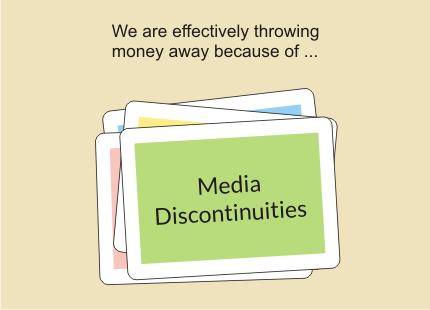
One of the keys to profitability with established products is improving the efficiency of core processes. This may mean either increasing productivity or reducing costs, or both of these. For this reason, one of the classic tasks for an idea production and evaluation consultancy like Zephram is to help clients identify such opportunities.
One tool which we like to use for developing cost reduction ideas is a set of flashcards, each of which names a potential source of process inefficiency. There are thirty flashcards in total, derived from different knowledge sources including both our own experience and standard approaches such as the lean production movement.
The first five cards in the deck are:
- Media discontinuity
- Friction
- Overhead
- Redundancy
- Bureaucracy
The implementation as flashcards makes various techniques available to our facilitators. In the simplest case, they can simply be played out sequentially on the table (the „Las Vegas“ method). We find it helpful to provide additional inspiration with partial sentences to go with the cards such as …
- We are effectively leaving money on the table because of …
- Our people are occasionally not creating value for the customer owing to …
- The one thing that really holds back our productivity is …
A further improvement to the ideation support can be obtained by providing a breakdown of the process under investigation, for example:
- Receiving parts
- Preparing completed units for transport
- Re-tooling machines
- Dealing with rejects
- Requisitioning tools from the workshop
- Dealing with unannounced changes in customer demands
This leads to facilitation suggestions such as
- We are effectively leaving money on the table because of bureaucracy in dealing with rejects.
- Our people are occasionally not creating value for the customer because they are performing redundant activities while receiving parts.
For clients who understand their own processes well, such rich suggestions are very effective in generating ideas for improving process efficiency.
Zuletzt aktualisiert am 12. März 2024 von Graham Horton
